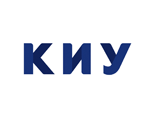KIU was awarded for contribution to the development of ethics in the field of artificial intelligence
On November 16, 2023, the TASS Russian News Agency hosted the “AI Ethics Forum: Generation GPT. Redlines". As part of the Forum, an award ceremony in the field of ethics of artificial intelligence was held. For the development of a draft Code of ethics for entities engaged in the creation, use and disposal of medical products based on artificial intelligence technologies (hereinafter referred to as the Code of Ethics), the Kazan Innovative University named after V.G. Timiryasov was awarded.

The draft Code of Ethics was developed by legal scholars of the Research Institute of Digital Technologies and Law of the Kazan Innovative University - senior researcher, candidate of legal sciences Albina Shutova and chief researcher, doctor of legal sciences, associate professor, honored lawyer of the Republic of Tatarstan Ildar Begishev.
In a solemn atmosphere, the award of the Kazan Innovative University was presented to the representative of KIU - Vice-Rector for Corporate Management, Doctor of Economic Sciences, Professor Timur Kramin.
At the Forum, Russian President Vladimir Putin addressed the participants and guests of the event, he noted the importance of this area for the country. According to him, work in the field of artificial intelligence is an important part of the technological development of Russia's production and information capabilities.
The forum is aimed at demonstrating the best practices in the application of artificial intelligence ethics, developing a current set of projects to improve the ethical and normative regulation of artificial intelligence, and forming a list of initiatives on the development of artificial intelligence ethics for inclusion in the updated National Strategy for the Development of Artificial Intelligence until 2030.
The central theme of the forum was the discussion of the development of artificial intelligence through the introduction of effective legislative regulation, which will “close” all the negative consequences that the technology potentially carries, but will not become an obstacle to the development of artificial intelligence.

Let us recall that the Code of Ethics is a set of general principles of professional ethics and basic rules of official conduct that should guide entities engaged in the creation, use and disposal of medical products based on artificial intelligence technologies, and is aimed at strengthening the authority of medical workers and increasing trust patients to artificial intelligence technologies and preventing potential negative consequences as a result of their use.
The Code of Ethics is intended for legal scholars and practitioners, medical professionals, members of clinical ethics committees, medical ethicists, representatives of law-making bodies, government departments, the business community and public organizations, patients, as well as a wide range of socialists interested in issues of digital transformation healthcare systems.

 ПРЕД
СЛЕД
ПРЕД
СЛЕД 


 Личный кабинет
Личный кабинет 




